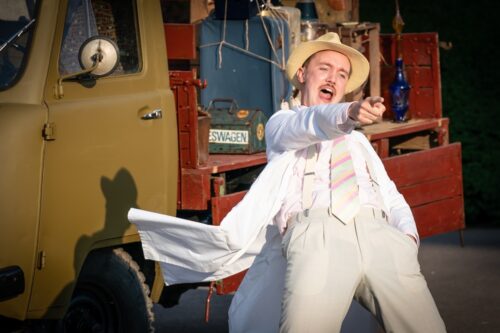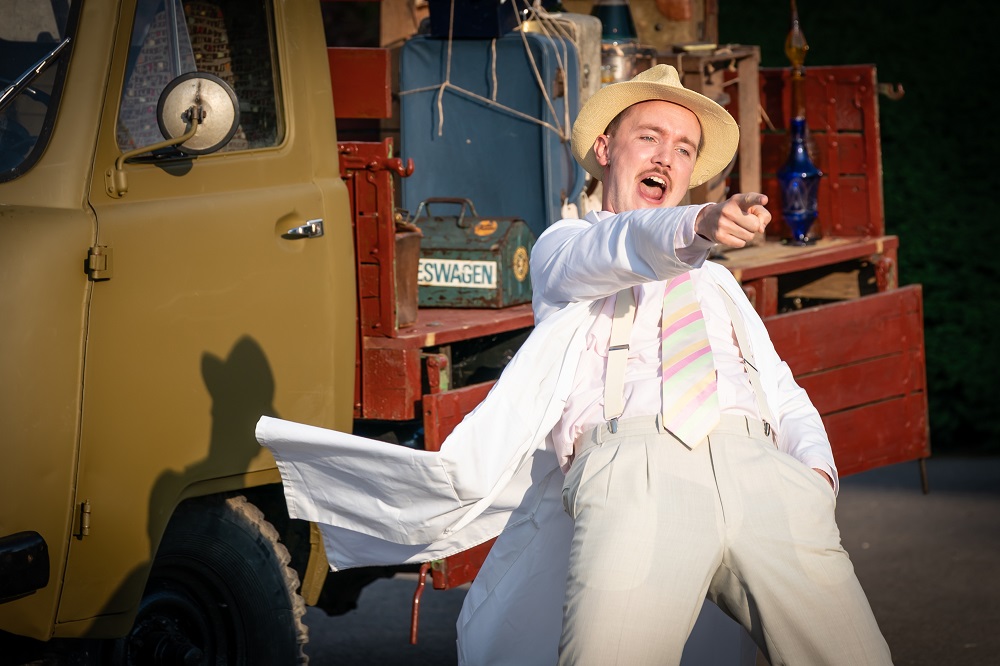 United Kingdom Waterperry Opera Festival 2021 – Donizetti, The Elixir of Love (L’elisir d’amore): Soloists, Chorus and Orchestra of Waterperry Opera Festival / Bertie Baigent (conductor). Waterperry Garden, Oxfordshire, 14.8.2021. (JPr)
United Kingdom Waterperry Opera Festival 2021 – Donizetti, The Elixir of Love (L’elisir d’amore): Soloists, Chorus and Orchestra of Waterperry Opera Festival / Bertie Baigent (conductor). Waterperry Garden, Oxfordshire, 14.8.2021. (JPr)

Production:
Director – Dan Ayling
Designer – Ana Inés Jabares-Pita
Lighting designer – Matt Haskins
English translation – Kelley Rourke
Cast:
Adina – Alison Langer
Nemorino – Thando Mjandana
Dulcamara – Oskar McCarthy
Belcore – Darwin Prakash
Giannetta – Daniella Sicari
Also: Lili Boulanger’s Clairières dans le ciel (Clearings in the Sky): Emma Doherty (director), Siân Dicker (soprano) and Krystal Tunnicliffe (piano)
‘If you go down in the woods today, you’re sure of a big surprise.’ Well, that was the feeling on a first visit to Waterperry Opera Festival now in its fourth season. You can read how Waterperry Garden is ‘Just a stone’s throw from Oxford, and within easy reach of London’ and how they were ‘Made famous by Beatrix Havergal who established her School of Horticulture for Ladies here from 1932 to 1971’ and now is ‘a home to eight acres of beautifully landscaped ornamental gardens, a pre-Conquest church, a large collection of contemporary frescoes, a garden centre, galley, museum, tea shop and an amphitheatre.’ On a gloriously sunny afternoon (something of a rarity in August 2021) it was a delightful place to be and an oasis of calm allowing anyone to escape the depressing news headlines.
Hanging weightily over both events I saw on this first visit was Wagner’s Tristan und Isolde. In a woodland glade there was a performance of the song cycle Clairières dans le ciel (Clearings in the Sky) by Paris-born Lili Boulanger who had a tragically short life, and it was composed in 1914, four years before she died at 24 having battled Crohn’s disease. The poems Lili – younger sister of the more renowned Nadia Boulanger (who lived to 92!) – chose came from the 1905 collection Tristesses (Sorrows) by symbolist poet Francis Jammes. Lili knew she would not live to a great age and gave her cycle of 13 of them a cheerier title (though still they were not officially premiered until a week before her death). The number she selected had great significance to Lili; they were the number of letters in her name and apparently her initials ‘LB’ looked, to her, rather like 13. What Lili left us, I understand, is almost certainly autobiographical and she believed herself to be the young girl who disappears from a poet’s life and who he reminisces about.

Soprano Siân Dicker sang affectingly in the open-air and Krystal Tunnicliffe at an unamplified upright piano valiantly played the accompaniment with its delicate scent of Debussy. Director Emma Doherty ‘staged’ this on a huge chair-shaped structure and changed the emotions we heard from ‘romantic love lost’ to showing us ‘a mother who is revisiting the river where she witnessed her infant daughter drown and is reflecting on her guilt, grief and sadness a year on.’ Having Dicker ‘portray’ Lili Boulanger might have worked even better but it was an intriguing concept nonetheless giving that what we heard was in the original French and there was no explanation of the individual songs in the programme. As for Tristan? The sixth song, the deeply melancholic ‘Si tout ceci n’est qu’un pauvre rêve’ (‘If all this is just a poor dream’) is suffused with that opera’s chromaticism mainly because it directly samples Wagner’s music.
‘Plot’ is too serious a word for what we see happen in Donizetti’s 1832 The Elixir of Love: basically, it is a rom-com, albeit a bel canto one. A ‘love triangle’ (of sorts) involves the flighty Adina, her lovestruck admirer, Nemorino, and a womanising soldier, Belcore. If you are a newcomer to this opera, where is Tristan here you may be wondering? Well, we hear about the effects of Isolde’s love potion on Tristan and Nemorino wants some of it for himself to ensure his wooing of Adina is a success. The deus ex machina in all this is the charlatan Dulcamara’s dodgy cure-all elixir and also central to what we see is how wealth is an aphrodisiac. There is little underlying darkness to the story but what little there is involves how Nemorino is willing to enlist and possibly die in battle when he is strapped for cash and wants more elixir. It is also just a little odd how Adina eventually warms to him, having been so fickle with her affections for most of the opera.
Considering what we do get to see, director Dan Ayling’s programme note was perhaps taking things a little too seriously when referring to Kelley Rourke’s English translation – first used for the late Jonathan Miller’s staging of The Elixir of Love at English National Opera more than a decade ago – and how it ‘locates the story in 1950 America, just before the US joins the Korean War. It’s a useful context in which to explore the role of women in an oppressive patriarchy, and offers an opportunity to investigate the darker psychological complexities of a strong, dynamic woman and the men who try to win her affections’.
In front of Waterperry House’s impressive Queen Anne frontage we are welcomed to ‘Adina’s Spa Retreat’ in New York’s Saratoga Springs. Spa manager Giannetta is giving her eight staff their instructions for the day. As ever there is the impression that the rich and successful Adina longs for affection as much as her independence. ‘Top Gun’ airman Belcore arrives to woo Adina, but she spurns his advances which does not go down too well with someone who actually loves himself more than he would her. However, the janitor Nemorino is totally besotted with Adina and guilelessly buys his supposed love potion – nothing more than bootleg booze – from Dulcamara. A drunken Nemorino appals Adina who on the spot becomes determined to marry Belcore.
News of America’s involvement in the Korean War (as against their current flight from Afghanistan!) means the wedding must be that very night before Belcore is called away. The $20 he gets for enlisting buys Nemorino his second bottle and seems to be working when he must fend off Giannetta and the women staff, although that is [spoiler alert!] because only they know his rich uncle has died and he has inherited a fortune. True love wins out in the end for the happiest of all outcomes as – according to the director – ‘Adina and Nemorino ride off into the sunset’.
Thankfully much fun was had by all by a hardworking cast of 13 (that number again!) and – with a rare use of the word by me – it was brilliantly staged by Ayling; even more remarkable given the limited resources of just eight additional performers in addition to the principal cast. The entire width of a platform constructed in front of the imposingly large country house was used to show us the spa in Act I and the wedding of ‘Adina & Belcore’ in Act II. That along with Ana Inés Jabares-Pita’s colourful and time-appropriate costumes transported us from verdant Oxfordshire to Saratoga Springs; though because – unlike at English National Opera – we were spared any cod American accents, what we saw and heard was more like a musical version of a Carry On film. Ayling’s ‘choreography’ demanded wonderfully timed movement onto and around the set with several entrances and exits through the audience and the unflagging, energetic cast were exceptional and as good as anything I have ever watched from somebody other than a flagship opera company.
It takes a while to get used to sound of Donizetti played by a small ensemble of 11 spiritedly conducted by Waterperry Festival Opera’s music director Bertie Baigent. But once you do, Donizetti’s score sounded as idiomatically fresh, effervescent and dynamic as you could ever expect. Vocally there was not a weak link in the cast, headed by a Nemorino of exceptional promise from Thando Mjandana with his – all-too-rare these days – true, clear and musical Italianate lyric tenor. His highlight just had to be his nuanced heartfelt romanza ‘I saw a tear fall silently’ (‘Una furtiva lagrima’). Alison Langer’s haughty, free-spirited Adina was sung with a secure technique and real emotional range and was a perfect match for Mjandana’s Nemorino.

Throughout this The Elixir of Love the comedy is quite broad (thoughts of Carry On again!) and most of it centres on Oskar McCarthy’s smarmy Dulcamara as the archetypal ‘snake oil salesman’. His is an eye-catching physical performance and he is also vocally assured, notably with all his amusing patter when describing the remarkable powers of his ‘medicine’. Darwin Prakash has a baritone voice I look forward to hearing more of and was rather Elvis-like as the swaggering, conceited sergeant Belcore, full of braggadocio. Rounding off the cast was Daniella Sicari’s slightly officious, though suitably perky Giannetta and the enthusiastic – and dramatically committed – chorus of four men and four women (all Waterperry Opera Festival Young Artists) as the spa staff and, as appropriate, airmen.
These memorable operatic fireworks from the Waterperry Opera Festival were perfectly matched by the real ones celebrating the wedding of Adina and Nemorino at the end of the opera!
Jim Pritchard
For more about the Waterperry Opera Festival click here.
